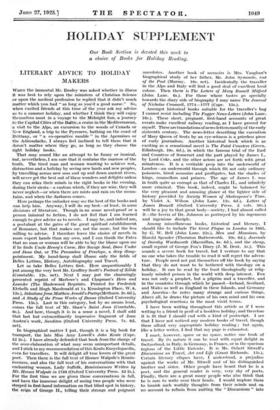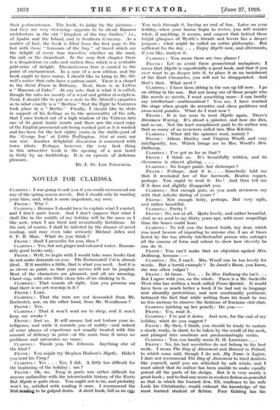HOLIDAY SUPPLEMENT
Our Book Section is devoted this week to a choice of Books for Holiday Reading.
LITERARY ADVICE TO HOLIDAY MAKERS
WanN the immortal Mr. Dooley was asked whether in illness it was best to rely upon the ministers of Christian Science ; or upon the medical profession he replied that it didn't much matter which you had " as long as you'd a good nurse." So, When excited friends at this time of the year ask my advice as to a summer holiday, and whether I think they will enjoy 'themselves most in a voyage to the Midnight Sun, a journey to the Capital Cities of the Baltic, a cruise in the Mediterranean, 1.a visit to the Alps, an excursion to the woods of Canada or New England, a trip to the Pyrenees, bathing on the coast of :Brittany, or "a co-operative ramble " in the Apennines or the Adirondacks, I always feel inclined to tell them that it doesn't matter where they go, as -long as they choose the 'right holiday books.
That may sound like an attempt to be funny or ironical, :but, nevertheless, I am sure that it contains the marrow of the truth. The tired man and woman wanting to achieve rest, distraction and a holiday by seeing new lands and new peoples, by travelling across new seas and up and down ancient rivers, ;will never get the best out of these wonders and delights unless they can relax their minds in the right books in the evening, during their siesta—a custom which, if they are wise, they will never neglect—or when there are mists and rain on the moun- tains, and when the darkness comes.
Here perhaps the Onlooker may see the best of the books and /can help him. Anyway, I will do my best—at least, in some divisions of literature. Though in no sense novel-proof or a person inimical to fiction, I do not feel that I am learned enough to give advice as to novels. I may be, and indeed am, a postulant at the gates of the great spiritual establishment of Romance, but that makes me, not the more, but the less /willing to advise. I therefore leave the choice of novels in more expert hands than my own, and I can thank the Fates that no man or woman will be able to lay the blame upon me if he finds Uncle Henry's Curse, Her Savage Soul, Done Under and Done Out, or The Penumbra of Penelope, a deep disap- pointment. My hand-lamp shall illume only the fields of Belles Lettres, History, Autobiography and Travel.
Let us take Belles Lettres first. Here unquestionably I put among the very best Mr. Geoffrey Scott's Portrait of Zelide (Constable. 12s. net). Next I may put the charmingly presented reprint of Marlowe's and Chapman's Hero and
eander (The Haslewood Reprints. Printed for Frederick Etchells and Hugh Macdonald at In Kensington Place, W. 8. '15s.), Selections from Matthew Arnold' s Poetry (Methuen. 3s. 6d.), and A Study of the Prose Works of Donne (Oxford University Press. 15s.). Last in this category, but by no means least, .comes the full text of Mr. Shaw's Saint Joan (Constable. Os.). And here, though it is in a sense a novel, I shall add that last but extraordinarily impressive fragment of Jane 'Austen's work, Sanditon (Oxford University Press, 7s. 6d. net).
• In biographical matter I put, though it is a big book for transport, the late Miss Amy Lowell's John Keats (Cape. £2 2s.). I have already defended that book from the charge of the over-elaboration of what may seem unimportant details, and I stick to my recommendation of this Keats Encyclopaedia, even for travellers. It will delight all true lovers of the great poet. Then there is the full text of Horace Walpole's Remin- iscences, and also the full text of his conversations with that enchanting woman, Lady Suffolk, Reminiscences Written by Mr. Horace Walpole in 1788 (Oxford University Press. £2 2s.). For the first time we are given these conversations in full,
and have the immense delight of seeing two people who were steeped in first-hand information on that blind spot in history, the reign of George U., telling their strange and poignant
anecdotes. Another book of memoirs is Mrs. Vaughan's biographical study of her father, Mr. John Symonds, Out of the Past (Murray. 16s. net). Incidentally the traveller in the Alps and Italy will find a good deal of excellent local colour. Then there is The Letters of Mary Russell Milford (John Lane. 6s.). For those whose tastes go specially towards the diary side of biography I may name The Journal of Nicholas Cresswell, 1774-1777 (Cape. 15s.).
Amongst historical books suitable for the traveller's bag I cannot resist including The Fugger News-Letters (John Lane. 16s.). These short, pregnant, first-hand accounts of great events make excellent railway reading, as I have proved for myself. These are translations of news-letters mostly of the early sixteenth century. The news-letter describing the execution of Mary Queen of Scots by an eye-witness is a priceless piece of early journalism. Another historical book which is as exciting as a sensational novel is The Fatal Countess (Green, Edinburgh. 10s. 6d.), in which the famous trial of the Earl and Countess of Somerset and the part played by James I., by Lord Coke, and the other actors are set forth with great minuteness. It is a veritable peep into the underworld of- London—an underworld through which flit not only ordinary poisoners, hired assassins and profligates, but the shades of kings, counsellors and princes. The age of James I. was in truth quite as corrupt as that of Charles II., and infinitely more criminal. This book, indeed, might be balanced by the very pleasant and amusing glance at the lighter side of history provided by Society Women of Shakespeare's Time,
by Violet A. Wilson (John Lane. 12s. Letters of James Boswell (Oxford University Press. 2 vols. 36s.) will be a joy to that great body—society, I had almost called it—the lovers of Dr. Johnson as portrayed by his ingenuous and ingenious disciple.
Among miscellaneous books, historical and literary, I should like to include The Great Plague in London in 1665, by G. W. Bell (John Lane. 25s.), Men and Mansions, by Harold Spender (Thornton Butterworth. 10s. 6d.), Journals of Dorothy Wordsworth (Macmillan, 8s. 6d.), and the cheap, small reprint of George Fox's Diary (J. M. Dent. 5s.). This sounds a severe book for travel, but I venture to say that no one who takes the trouble to read it will regret the adven- ture. People need not put themselves off the book by saying that they do not want to be bothered with theology on a holiday. It can be read by the least theologically or relig- iously minded person in the world with deep interest. Fox was not only a prophet, but a pilgrim and a traveller, and in the countries through which he passed—Ireland, Scotland, and Wales as well as England in these Islands, and Germany and America—he notes many strange and curious things. Above all, he draws the picture of his own mind and his own psychological reactions in the most vivid terms.
I have been writing throughout this article as if I were writing to a friend in peril of a bookless holiday, and therefore
it is fit that I should end with a kind of postscript. I see that I have not noticed any modern books of travel, though these afford very appropriate holiday reading ; but again, like a letter writer, I find that my page is exhausted.
I must, however, space or no space, notice one book of travel. By its nature it can be read with equal delight in
Switzerland, in Italy, in Germany, in France, or in the spacious regions of the Little Entente. It is Mr. Osbert Sitwell's Discursions on Travel, Art and Life (Grant Richards. 15s.).
Certain literary cliques have, I understand, a prejudice against the works of Mr. Sitwell and of his distinguished brother and sister. Other people have heard that he is a poet, and the general reader is very, very shy of poets.
Finally, there are a great many people who also think that he is sure to write over their heads. I would implore them to banish such worldly thoughts from their minds and on no account to refrain from putting the " Discursions " into their portmanteaux. The book, to judge by the pictures— and they arc very charming—appears to be about Barocco architecture in the old " kingdom of the two Sicilies," i.e., of Apulia and the Island, and in Southern Germany. As a matter of fact, the book is filled from the first page to the last with those " humours of the fray " of travel which are the delight of every true traveller, whether on the road, the rail, or the steamboat. In the very first chapter there is a disquisition on cabs and station flies, which is a veritable gold-mine of delight. Discursiveness here is carried to the point of enchantment. In a case of a new edition, and the book ought to have many, I should like to bring to Mr. Sit- well's notice that cabs have a patron saint. There is a chapel to the Saint Fiacre in Brittany. Next, there is in Lisbon a " Museum of Cabs." At any rate, that is what it is called, though the cabs are mostly of a royal and golden description. Next, I should like to put as a note to Mr. Sitwell's enquiries as to what exactly is a " Berlin° " that the flight to Varennes took place in a " Berlin." Finally, I should like to state in support of his feelings as to the universality of the cab, that I once looked out of a high window of the Vatican into one of its great inside courts and there saw the exact copy of the English provincial cab being washed just as it is washed and has been for the last eighty years, in the stable-yard of the ` George Inn' at Little Pedlington. Sint ut runt, aut non sint. Another delightful discursion is concerned with town idiots. Perhaps, however, the very best thing in this attractive book is the opening of a new hotel in Sicily by an Archbishop. It is an episode of delicious pleasure.
BY J. ST. LOT: STRACHEY..











































 Previous page
Previous page